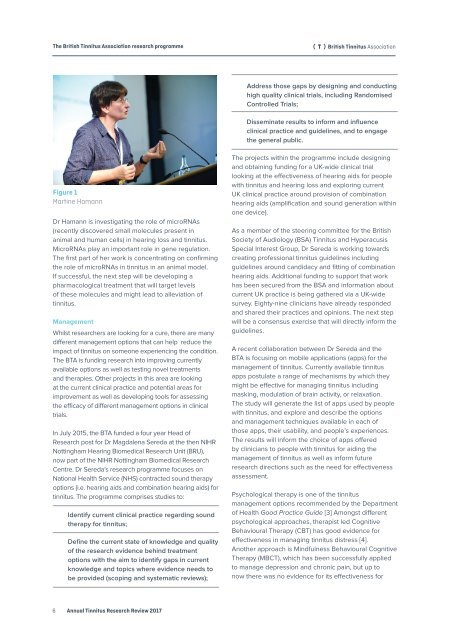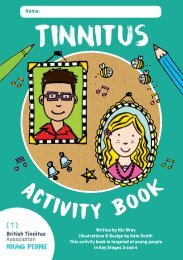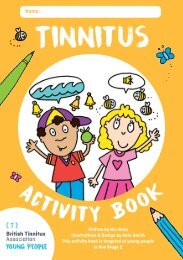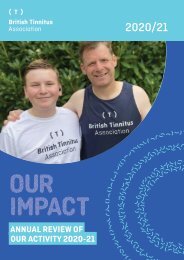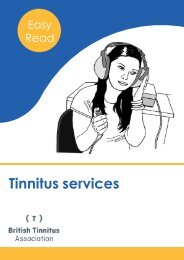The British Tinnitus Association Research Programme
You also want an ePaper? Increase the reach of your titles
YUMPU automatically turns print PDFs into web optimized ePapers that Google loves.
<strong>The</strong> <strong>British</strong> <strong>Tinnitus</strong> <strong>Association</strong> research programme T <strong>British</strong> <strong>Tinnitus</strong> <strong>Association</strong><br />
Address those gaps by designing and conducting<br />
high quality clinical trials, including Randomised<br />
Controlled Trials;<br />
Disseminate results to inform and influence<br />
clinical practice and guidelines, and to engage<br />
the general public.<br />
Figure 1<br />
Martine Hamann<br />
Dr Hamann is investigating the role of microRNAs<br />
(recently discovered small molecules present in<br />
animal and human cells) in hearing loss and tinnitus.<br />
MicroRNAs play an important role in gene regulation.<br />
<strong>The</strong> first part of her work is concentrating on confirming<br />
the role of microRNAs in tinnitus in an animal model.<br />
If successful, the next step will be developing a<br />
pharmacological treatment that will target levels<br />
of these molecules and might lead to alleviation of<br />
tinnitus.<br />
Management<br />
Whilst researchers are looking for a cure, there are many<br />
different management options that can help reduce the<br />
impact of tinnitus on someone experiencing the condition.<br />
<strong>The</strong> BTA is funding research into improving currently<br />
available options as well as testing novel treatments<br />
and therapies. Other projects in this area are looking<br />
at the current clinical practice and potential areas for<br />
improvement as well as developing tools for assessing<br />
the efficacy of different management options in clinical<br />
trials.<br />
In July 2015, the BTA funded a four year Head of<br />
<strong>Research</strong> post for Dr Magdalena Sereda at the then NIHR<br />
Nottingham Hearing Biomedical <strong>Research</strong> Unit (BRU),<br />
now part of the NIHR Nottingham Biomedical <strong>Research</strong><br />
Centre. Dr Sereda’s research programme focuses on<br />
National Health Service (NHS) contracted sound therapy<br />
options (i.e. hearing aids and combination hearing aids) for<br />
tinnitus. <strong>The</strong> programme comprises studies to:<br />
Identify current clinical practice regarding sound<br />
therapy for tinnitus;<br />
Define the current state of knowledge and quality<br />
of the research evidence behind treatment<br />
options with the aim to identify gaps in current<br />
knowledge and topics where evidence needs to<br />
be provided (scoping and systematic reviews);<br />
<strong>The</strong> projects within the programme include designing<br />
and obtaining funding for a UK-wide clinical trial<br />
looking at the effectiveness of hearing aids for people<br />
with tinnitus and hearing loss and exploring current<br />
UK clinical practice around provision of combination<br />
hearing aids (amplification and sound generation within<br />
one device).<br />
As a member of the steering committee for the <strong>British</strong><br />
Society of Audiology (BSA) <strong>Tinnitus</strong> and Hyperacusis<br />
Special Interest Group, Dr Sereda is working towards<br />
creating professional tinnitus guidelines including<br />
guidelines around candidacy and fitting of combination<br />
hearing aids. Additional funding to support that work<br />
has been secured from the BSA and information about<br />
current UK practice is being gathered via a UK-wide<br />
survey. Eighty-nine clinicians have already responded<br />
and shared their practices and opinions. <strong>The</strong> next step<br />
will be a consensus exercise that will directly inform the<br />
guidelines.<br />
A recent collaboration between Dr Sereda and the<br />
BTA is focusing on mobile applications (apps) for the<br />
management of tinnitus. Currently available tinnitus<br />
apps postulate a range of mechanisms by which they<br />
might be effective for managing tinnitus including<br />
masking, modulation of brain activity, or relaxation.<br />
<strong>The</strong> study will generate the list of apps used by people<br />
with tinnitus, and explore and describe the options<br />
and management techniques available in each of<br />
those apps, their usability, and people’s experiences.<br />
<strong>The</strong> results will inform the choice of apps offered<br />
by clinicians to people with tinnitus for aiding the<br />
management of tinnitus as well as inform future<br />
research directions such as the need for effectiveness<br />
assessment.<br />
Psychological therapy is one of the tinnitus<br />
management options recommended by the Department<br />
of Health Good Practice Guide [3] Amongst different<br />
psychological approaches, therapist led Cognitive<br />
Behavioural <strong>The</strong>rapy (CBT) has good evidence for<br />
effectiveness in managing tinnitus distress [4].<br />
Another approach is Mindfulness Behavioural Cognitive<br />
<strong>The</strong>rapy (MBCT), which has been successfully applied<br />
to manage depression and chronic pain, but up to<br />
now there was no evidence for its effectiveness for<br />
6<br />
Annual <strong>Tinnitus</strong> <strong>Research</strong> Review 2017


